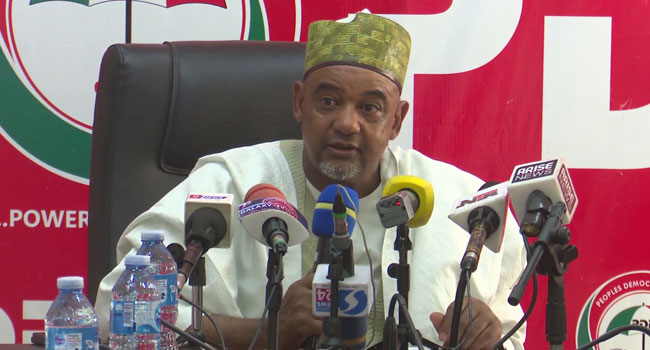The Nigerian political landscape is bracing for the 2027 general elections, with the Peoples Democratic Party (PDP) framing the upcoming contest as a referendum on the prevailing socio-economic hardships faced by Nigerians under the current All Progressives Congress (APC) administration. The PDP, through its Acting National Chairman, Umar Damagum, has characterized the election as a direct confrontation between the ruling party and the Nigerian populace, a stark departure from the traditional party-versus-party narrative. This framing seeks to galvanize public sentiment against the APC, portraying the election as an opportunity for citizens to express their discontent with the government’s performance and hold them accountable for the nation’s challenges.
Damagum’s pronouncements underscore the PDP’s strategy to capitalize on widespread public dissatisfaction with the economic realities in Nigeria. He emphasizes the daily struggles of ordinary Nigerians, highlighting the increasing cost of living, unemployment, and insecurity, and directly attributes these hardships to the policies and actions of the APC government. By emphasizing the “pain” felt by the common man, the PDP aims to connect with the electorate on an emotional level, presenting itself as the alternative that can alleviate their suffering and provide a better future. This narrative seeks to transcend traditional political divides and unite Nigerians under a common cause: reclaiming their nation from a government perceived as failing to deliver on its promises.
The timing of Damagum’s statements coincides with significant internal challenges within the PDP, most notably the defection of key figures from Delta State, including the Governor, Sheriff Oborevwori, and his predecessor, Ifeanyi Okowa, to the ruling APC. This defection represents a considerable blow to the PDP, given Delta State’s historical significance as a stronghold for the party. Damagum acknowledges the emotional impact of this defection, highlighting the substantial support the PDP had extended to Delta State over the years. This defection underscores the fluidity of political allegiances in Nigeria and adds another layer of complexity to the unfolding political drama in the lead-up to the 2027 elections.
The PDP’s characterization of the 2027 elections as “APC versus Nigerians” reflects a strategic attempt to shift the focus away from internal party dynamics and project an image of unity and purpose. By presenting the election as a battle between the ruling party and the people, the PDP aims to minimize the impact of internal dissent and defections, portraying them as isolated incidents rather than symptomatic of larger issues within the party. This narrative also seeks to deflect attention from the PDP’s own internal struggles and refocus the public discourse on the perceived failures of the APC government.
The defection of prominent figures from Delta State, however, presents a significant challenge to the PDP’s efforts to project an image of strength and unity. Damagum’s expression of disappointment and his acknowledgement of the “pain” caused by the defection reveal the underlying vulnerability of the party. While he attempts to downplay the significance of the defection by emphasizing the PDP’s resilience and its ability to overcome such challenges, the defection nonetheless exposes cracks within the party’s ranks and raises questions about its ability to present a united front against the APC.
The 2027 general elections are shaping up to be a critical juncture in Nigeria’s political trajectory. The PDP’s framing of the election as a referendum on the APC’s performance and the hardships faced by Nigerians sets the stage for a highly charged and potentially divisive campaign. The defection of key figures from Delta State further complicates the political landscape, adding an element of unpredictability to the outcome. As the nation moves closer to the polls, the ability of both the PDP and the APC to effectively address the concerns of the electorate and present compelling visions for the future will be crucial in determining the outcome of this pivotal election.


